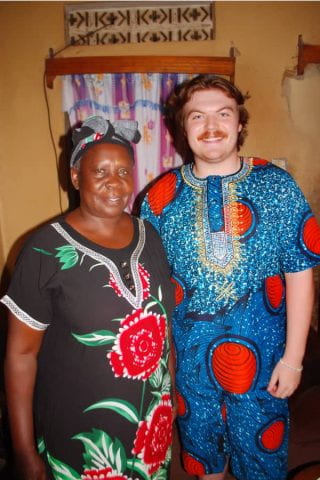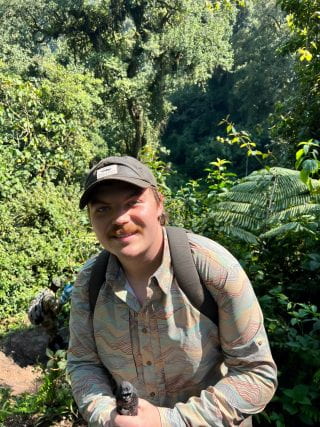Zachary Wilmoth is an Honors College Fellow from Cabot, Arkansas, studying history. He studied abroad this summer in Rwanda and Uganda researching past conflicts in both countries. He encountered a very different learning environment while on his trip, though not without some reminders of home.
Before I began at the University of Arkansas, I knew without a doubt that I wanted to study abroad. However, with COVID-19 cancellations and unexpected changes in the timeline of my degree completion, my only chance would be the summer of 2022. With that in mind, I had to make the big decision of where I wanted to spend my summer. Despite all the choices, my options were limited to the geographical area I wanted to study in. As a history major, I have centered my focus on Africa in the post-colonial era, so I knew I would study in a sub-Saharan African nation. I mulled over the choices, and I finally landed on the SIT Rwanda & Uganda Peace & Conflict Studies program. I was drawn to the program’s modern focus as well as the opportunity to live in a homestay during my time in each respective nation. As I hope to one day be a professor of African history, the opportunity to conduct research on the continent so early in my academic journey seemed incredibly valuable.
My instructors were amazing and knowledgeable, as they had lived through the conflicts we were studying. I commended them for their determination to not give us an opinion to believe, but to have us to form our own opinions on the issues. The program was built around the idea of experiential learning, and so we did not have a traditional classroom setting. Instead, we would most commonly visit a site and have discussions with people like genocide survivors and child soldiers. This was nothing like classes at the University of Arkansas, which are built around the traditional idea of in class lectures and at- home readings. While we did have these at points during the study abroad, they were few and far between.
I was enamored by the cultures of Rwanda and Uganda, and the natural beauty of both countries was astounding. Just walking to my homestay from class it was not abnormal for me to cross paths with a baboon, which almost seemed to be the Ugandan version of squirrels on the U of A campus. However, the real natural wonders came during our gorilla trekking experience and safari. During both, we were mere feet away from majestic animals like lions, leopards and gorillas. It was especially meaningful with the knowledge that everyday species numbers are declining, and there is a legitimate possibility that some of these animals will no longer be around later on in my life.
The biggest shock to me came with the food. Not because it was different, but rather because it was quite like that of what would be called soul food in the Southern United States. Most meals consisted of Southern staples like collard greens, yams and rice along with a meat similar to barbecue or pot roast at times. While there were slight differences in some of the flavors, the food still reminded me of my grandmother’s cooking. Even thousands of miles away, it was like I still had a piece of home on the plate in front of me.

My host mother Clementine and I before the farewell party. I’m wearing Dashiki shirt made of kente cloth. It’s worn for special occasions, including at weddings and other celebrations.
I would without a doubt recommend this program to any student interested in the areas of Africa or Peace & Conflict studies. The experiences I gained will stay with me for a lifetime. In order to enjoy this program, though, you must be able to adapt. Running water, internet and electricity are not mainstays in parts of each country and their absence takes getting used to. Looking back, I do wish I had better prepared myself for this, as it did cause for a rough transition the first couple of days in country. However, after the first week I was adapted and made the most of the situation.
While I thoroughly enjoyed my time abroad, I wasn’t sad to leave as I did miss home. What I missed most was a big juicy cheeseburger which I did indulge in shortly after landing back in the United States. All in all, my time abroad was an unforgettable experience, and I recommend that everyone take the opportunity to go abroad to further their education.

